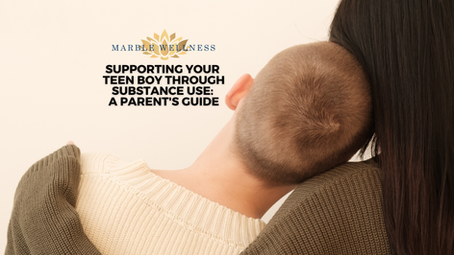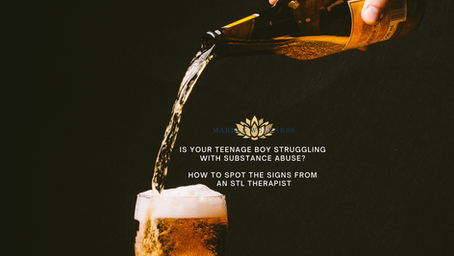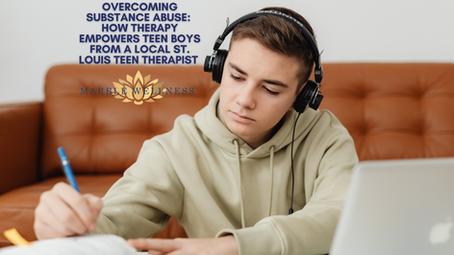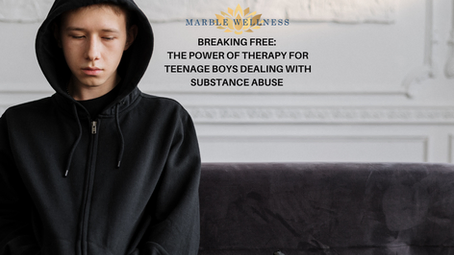
Hello, parents and caregivers!
As a mental health clinician, I understand that facing the reality of your teenager dealing with substance use or abuse can be overwhelming. It’s essential to remember that you are not alone in this journey.
Recently, we’ve been working to increase awareness of teens and substance abuse through a series of blogs, including signs your teenage boy is struggling with substance abuse; how mental health support can help overcome this challenge; and the power of therapy for treating substance abuse. how In this blog post, I’ll provide you with practical tips and strategies to navigate this challenging situation and support your teenager effectively.
9 Tips for Parents to Help Them Navigate Their Teenage Boy’s Substance Abuse
1. Stay Calm and Open Communication
Discovering that your teenager is involved with substances can be shocking and emotionally charged. Take a deep breath and try to remain calm.
This calmness doesn’t have to be your default state, but it should be very tangible when you’re talking to your teen, especially in the initial stages of learning about the substance abuse and intervening.
There will be other times you’ll feel very emotional, and we actually encourage those emotional states to be felt and expressed. But to the degree that can be shared with other adults and peers in your support group, instead of with your teenager, that would be better. (Which isn’t to say your teen shouldn’t know you are mad, scared, disappointed, etc, but we don’t want to lay the heaviness of those emotions at their feet when they are dealing with a budding addiction or some deeper pain that led to the substance abuse.
Open lines of communication are vital during this time.
Create a safe and non-judgmental space where your teen feels comfortable discussing their experiences and feelings. Be an active listener, allowing them to express themselves without interruption.
We know this sounds incredibly challenging. This will set the stage for what’s to come, and will be imperative for continued dialogue and partnership between you and your teenager.
2. Educate Yourself
Take the time to educate yourself about substance use and its effects. Understand the different types of drugs, signs of abuse, and the potential consequences. This knowledge will help you approach the situation with empathy and provide a better understanding of what your teenager might be going through.
3. Avoid Blaming and Shaming
It’s crucial to avoid blaming or shaming your teenager for their choices. Substance use is often a result of various complex factors, and blaming them will only push them away.
Instead, express your concern for their well-being and emphasize your commitment to supporting them through this challenging time.
Even if they don’t show it at the time, the gratitude your teenage boy will feel for you choosing this path will be so impactful for him.
4. Set Clear Boundaries and Consequences
Establishing clear boundaries is essential when addressing substance use. Communicate your family’s rules regarding substance use and establish consequences for breaking those rules. Make sure you are on the same page as any other adults, guardians, or caregivers. Brainstorm consequences with them ahead of time. Maybe even google some ideas. This will help you have a framework when it is time to deliver the consequence, and allow you to give a logical consequence, even when emotions are running rampant.
Be consistent in enforcing these boundaries, ensuring that your teenager understands the potential repercussions of their actions.
5. Seek Professional Help
Dealing with substance use can be overwhelming, and you don’t have to navigate this journey alone. Reach out to mental health professionals, counselors, or support groups specializing in substance abuse. These resources can offer guidance, support, and evidence-based strategies to help your teenager overcome their challenges.
Time with professionals can also help you find resources in your area that you may not have otherwise thought of. Our team of St. Louis therapists at our Marble Wellness office have so much collective knowledge and expertise and you could have access to all of it, even if just working in therapy with one of our therapists. Therapy can also give you space to rage, or cry, or maybe even have moments of confusion and fear, all without judgment. In other words, therapy can be the space where you spray all of the emotions you don’t want your teen to see or be responsible for.

6. Encourage Healthy Coping Mechanisms
Substance use often stems from a need to cope with stress or difficult emotions. Encourage your teenager to explore healthy coping mechanisms such as exercise, journaling, art, or spending time with positive friends. Engaging in these activities can provide healthier outlets for their emotions.
If those coping activities get rejected, keep trying. Lead by example or offer to participate in the activities with them. Or encourage them to participate in those hobbies and outlets with friends who you know are not using or abusing substances. Remember that peer influence we talked about in the last blog? Here’s a place it can come in handy.
Also, brainstorm with your teenage son. Get his input on activities he thinks could be helpful. Remind him of outlets he found joy in when he was younger or before he started experimenting with and using substances. Or ask him to consider a role model of his and what he thinks that role model might do to cope with stress.
There are lots of ways to come up with these activities, it just might take a few times to have the conversation and get them started.
7. Be Patient and Understanding
Recovery from substance use is a process that takes time, patience, and understanding. Be prepared for setbacks and relapses along the way. Offer your continuous support and remind your teenager that you believe in their ability to make positive changes.
And we will say it again: like any other difficult or healing journey, this is not a straightforward process. There will be ups and downs. Setbacks and disappointments. That does not erase all progress or mean that the other side of the substance abuse issue your teenage boy is dealing with cannot be reached.
8. Prioritize Self-Care
Supporting a teenager through substance use can be emotionally draining. Remember to prioritize your own self-care. Engage in activities that bring you joy, seek support from friends or support groups, and consider therapy for yourself if needed. Taking care of your well-being will enable you to be a more effective support system for your teenager.
Read that whole paragraph again, and sit with it for a moment.
Your health matters in this journey.
That’s your spiritual health, mental health, emotional health, physical health, and social health. You’ll need your cup to be consistently poured into, because you’ll constantly be pouring out of it, even more so than usual. Lean on your people. Do the leisure activity. Enlist help where you can. It’ll make all the difference, especially at a time where it might feel like nothing is making a difference.
9. Celebrate Progress and Effort
Recognize and celebrate your teenager’s efforts and progress, no matter how small they may seem. Positive reinforcement can be a powerful motivator and will boost your teen’s self-confidence during their recovery journey.
There may be days you feel too angry to do this, or too frustrated or tired. These celebratory moments are important, though, and are necessary for victory in the long-run.

Dealing with substance use or abuse in your teenager is undoubtedly challenging, but remember that you play a crucial role in their journey to recovery and healing. Approach the situation with compassion, understanding, and open communication. Seek professional help, set clear boundaries, and prioritize self-care to ensure you can provide the support your teenager needs. Together, we can navigate this difficult time and empower your teenager to make positive changes for a healthier and brighter future.
Meet Skyler Martin: Your Compassionate Guide on the Path to Healing
Hello there! I’m Skyler Martin, a devoted therapist at Marble Wellness, specializing in working with teens, adult men (especially dads!), and facilitating family therapy. With a passion for empowering individuals and families, I bring a wealth of knowledge and experience to my therapy practice.
For seven impactful years, I had the privilege of working at Ozark Teen Challenge, a renowned rehabilitation center for teenage boys. During my tenure there, I focused on specialized work in substance abuse, helping countless teens reclaim their lives from the grips of addiction. Witnessing their journeys to recovery solidified my commitment to making a positive impact on the lives of young men.
My dedication to addressing substance abuse extended to working with adults at Places for People, a prestigious nonprofit agency in St. Louis, for over a year. Through this experience, I gained invaluable insights into supporting individuals on their path to sobriety and emotional well-being.
In my therapy sessions, I foster a warm and empathetic environment, where clients can openly explore their challenges and emotions. Whether it’s helping parents cope and support their sons or providing therapeutic guidance to teenage boys, I am ready to be your steadfast ally on this transformative journey.
Reaching out to start therapy with me is the first step towards embracing a life beyond substance abuse. I am here to support you every step of the way, helping you find hope, healing, and a brighter future.
Start Therapy for Mental Health in St. Louis
If you live in St. Louis and are ready to improve your mental health, we are here to help.
Contact Us!

Additional Counseling Services at Marble Wellness in St. Louis, MO and Chicago, IL
Counseling services designed to help set you on a path of living a more fulfilled, calm, and happy life.
St. Louis
Our St. Louis team of therapists have a variety of training backgrounds and areas of expertise. We specialize in anxiety, depression, grief, chronic illness, therapy for men, couples, and maternal overwhelm. We can also help new moms with various postpartum concerns, moms in the thick of parenting, and moms with teens. We can also chat from wherever you are in the state with online therapy in Missouri and online therapy in Illinois. No matter where you are in your journey, we would love to support you.
Chicago
Our Chicago team of therapists offer a wide range of mental health services to help our clients through the different challenges and hurdles in their life. In addition to anxiety, depression, grief, therapy for men, and maternal overwhelm, we are specialized in professional burnout, therapy for breakups, and love partnering with working moms.



